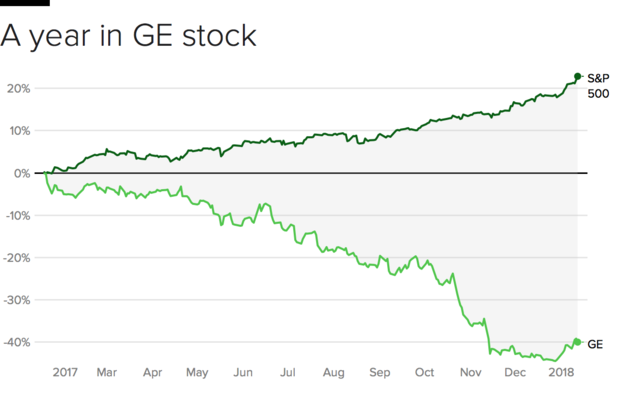GE breakup could happen, CEO suggests
General Electric (GE), for decades an industrial bellwether in the U.S., is considering breaking up.
In a special call with analysts on Tuesday to discuss the company's lackluster results, CEO John Flannery acknowledged that a breakup is one strategic option GE is exploring.
"I would categorize it as an examination of options and it's [the] kind of thing that could result in many, many different permutations, including separately traded assets, really, in any one of our units, if that's what made sense," he said when asked about the company's previously announced plans to disposed of poorly performing businesses.
He cited two GE units that are now independent: Baker Hughes, an oilfield services company that is majority-owned by GE, and Synchrony Financial, which became an independent financial company in 2015. "That's something we'd consider for other parts of the company, whether that's power, aviation or health care," he said.
Flannery, who took over as CEO in August, said late last year that GE planned to shed business units worth more than $20 billion over the next year or two. The company has been sell underperforming and non-core assets for over a decade now in a return to its industrial roots. It is the only component of the Dow Jones Industrial Average that was part of the original index.
GE's stock has had a dismal year, falling 40 percent while the S&P 500 rose nearly 23 percent. Shares of GE were down 3.4 percent in early trading Tuesday. The company is set to report results for the fourth quarter of 2017 next week.
The company is taking a $6.2 billion after-tax charge in the fourth quarter tied to its review and reserve testing of GE Capital's runoff insurance portfolio. GE Capital will also suspend its dividend to GE for the foreseeable future.
GE said last year that it would review its insurance reserves, particularly long-term polices generated by primary insurers, which were then re-insured by GE Capital and the holdings of its North American Live and Health. GE Capital plans to make statutory reserve contributions of about $15 billion over seven years. It will contribute about $3 billion in 2018's first quarter and approximately $2 billion annually from 2019 through 2024.
Flannery reiterated that the focus of the Boston company remains on making GE Capital "smaller and more focused."
His words showed that the CEO "was now open to a more transformative breakup scenario than the one he had previously communicated," Deane Dray, analyst for RCB Capital Markets, wrote in a note after the call. "Our view is that investors are looking at a wholesale breakup as the logical conclusion of this extended GE saga, though whether or not it transpires will depend on how successfully GE is able to address the ongoing structural challenges in Power."




